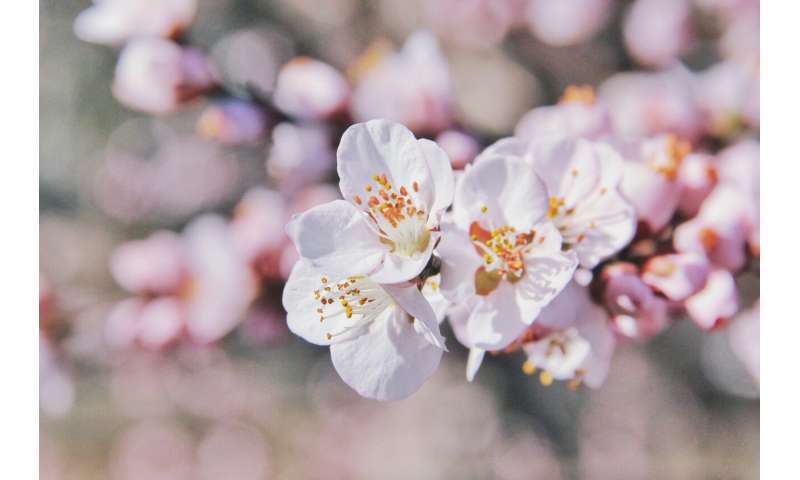Peach trees on climate watchlist in largest blossom study

The U.K.'s largest ever fruit tree monitoring project will include the observation of peach and apricot tree flowering dates for the first time.
Rising temperatures caused by global warming mean peaches and apricots in the U.K. are more suitable than ever for the U.K.'s climate ensuring that enough data can be recorded to observe when these trees begin to flower.
Understanding how climate impacts fruit tree blossom is the goal of the University of Reading research team behind FruitWatch. Scientists are appealing for the public's help to work out if rising temperatures are making fruit trees flower earlier in the year and how this might vary across different parts of the U.K.
But the FruitWatch team cannot record this data alone—they are calling on members of the public to tell them when the peach, apricot, quince, sloe trees and apples, cherry, pear and plum trees near them come into bloom.
Ph.D. researcher Chris Wyver, of the University of Reading, is running the project. He said, "FruitWatch is back for a third year in 2024 and it's bigger than ever before. This year, we are asking people to monitor four new fruit trees so we can understand how climate change is interfering with the flowering dates of various trees.
"Fruit trees are highly dependent on insect pollination to produce fruit. If rising temperatures are making fruit trees flower earlier, this could confuse bees and negatively impact pollination. Ultimately, this could mean less fruit is produced and supermarkets hike up the prices of apples and pears."
Photos wanted
FruitWatch launched in 2022 when people were asked to record when apple, pear, cherry and plum trees came into bloom. The research team received 6,000 submissions in the first year of the program and early analysis of the first year of results suggests flowering dates are highly sensitive to climate change. Trends in blossom dates across the United Kingdom from 2022 and 2023 are set to be revealed in a soon-to-be-published study.
The research team are eager to receive plenty of submissions in 2024 to analyze the long-term effect climate change is having on the flowering of fruit trees. To get involved, citizen scientists are being asked to make a note of when a particular fruit tree in their garden, their park, or their allotment comes into bloom.
Participants are also asked to take a photo of the tree in order to improve the reliability of the data received. These photos can also be shared on social media as part of the National Trust's #BlossomWatch campaign.
Participants can submit their records at fruitwatch.org and submissions can be viewed on an interactive map of the U.K.
Provided by University of Reading